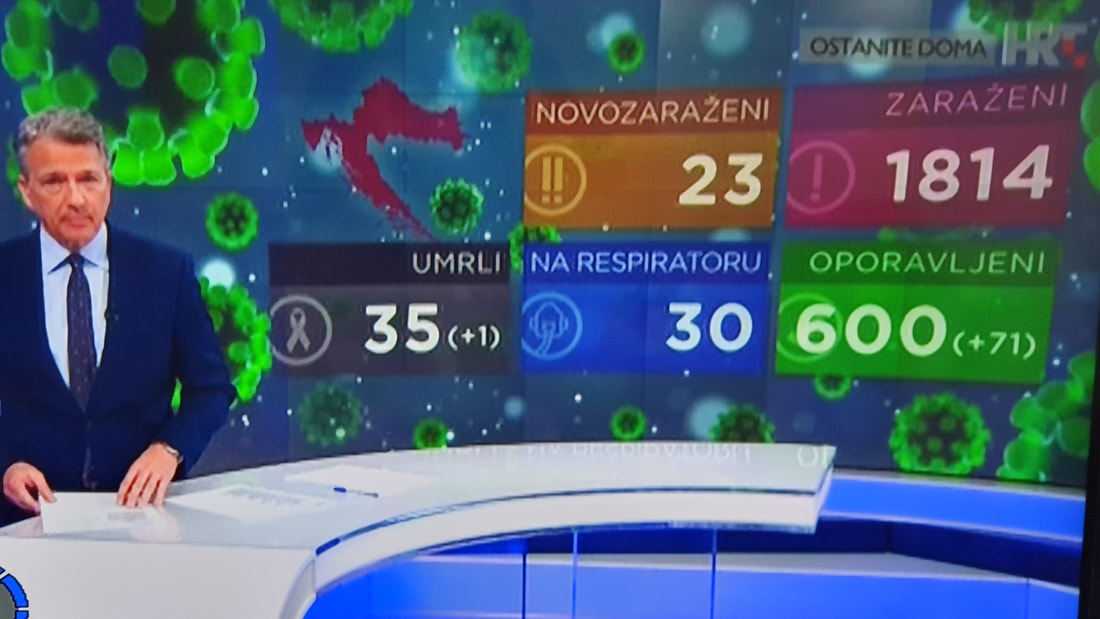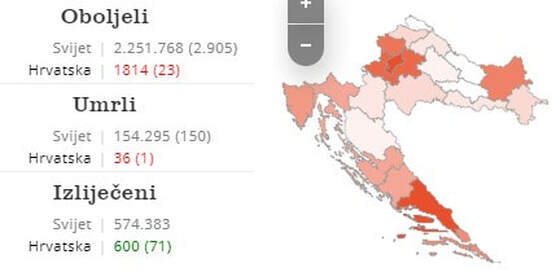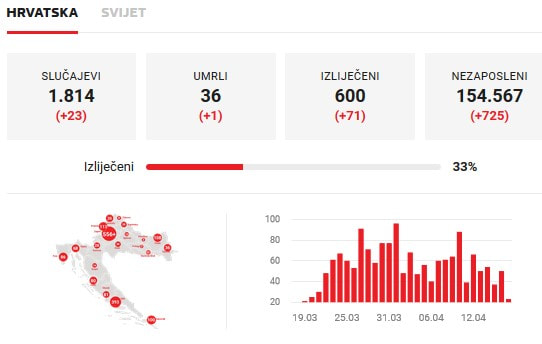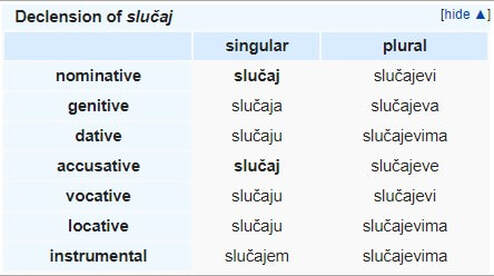Vocabulary THEMES: In the time of corona virus #001In the time of the corona virus
..... and other diseases
It is the first half of 2020, and the horrible effects of the coronavirus (or COVID-19) are at their peak (I hope). Just as everywhere in the world, the majority of news programmes in Croatia is concerned with this global issue. Initially I didn’t make much sense of these reports because the vocabulary is very specific to the situation. The terms used in Croatian to refer to this virus are koronavirus (although I have sometimes seen coronavirus) and KOVID-19 (KOVID devetnaest).
News reports have been dominated by statistical information: How many new cases yesterday? What is the total cases confirmed? How many have died? How do the numbers in our country compare with those in other countries? Are things looking better?
Facts, facts, facts ……. Which brings us to our first bit of relevant vocabulary: podatak (noun, masc.): fact, item of information. podaci, podatci (plural) data, facts, items of information.
Koji podaci? What are the important data?
Evo, na slici, podataka što sam snimao tijekom vijesti iz Zagreba 17. travnja 2020 g. This is a screenshot from the daily HRT1 TV news programme (Dnevnik): What does it all mean? What are all those terms used by the newsreader? Well, as in any field, understanding requires a relevant vocabulary, amongst other things. So, here goes …. How many people have been infected? Here is some relevant vocab: zaraza (noun, fem.): infection, contagion. Zaraza is not the same as bolest (illness). Bolest is a more encompassing term. A disease is a particular form of illness. zaraziti (nekoga): to infect (somebody) zaraziti se (nečim): to become infected, to contract a disease, to pick up a bug. Used with instrumental: zaraziti se tuberkulozom to be infected with/by tuberculosis; zaraziti se kovidom/koronavirusom zarazan (adj. masc. singular, nominative): infectious, contagious, communicable. zarazna bolest infectious disease; zarazna bolnica infectious diseases hospital; zarazni odjel infectious diseases ward. Also used in a figurative sense: zarazni smijeh contagious laughter zaražen (past participle, masc., singular, nominative): to have been infected. Tri žene su zaražene Three ladies became infected novozaraženi (ljudi) newly infected (people)
So, going back to the screenshot, we can see that the number of newly infected people (the previous day) was 23.
And the total (ukupno) number of people infected to that date was 1814. But here is a report on the same day, taken from the newspaper Jutarnji List, with data for Croatia as well as world-wide. Excuse the quality …
There is no category called zaraženi. You would think that this is the most important data. And indeed it is, but in Jutarnji List they use a different word, based upon the root bolest:
bolest (noun, fem.): sickness, illness. akutna bolest acute illness; kronična bolest chronic illness: zbog bolesti .... because of (due to) illness, .... oboljeti (pf, finished verb)/obolijevati (impf, continuous verb): to become ill, to come down with an illness. Ona je oboljela od gripe she came down with influenza. In the context of a disease, oboljen and zaražen can be used interchangeably. You can see that the number of oboljeli ljudi reported in Jutarnji List is the same (1814) as the number of zaraženi ljudi reported by Dnevnik. And wait …. Here is the data reported by INDEX.HR the same day.
Neither of the terms zaraženi nor oboljeli appear. These people choose to report the number of cases (slučajevi – the plural of slučaj).
From Wiktionary: How many people have died? umrijeti (pf, finished verb): to die, to pass away. umro (past participle, masc., singular, nominative): to have died. 22 ljudi je umrlo 22 people have died; 33 osobe su umrle od virusa 33 persons have died from the virus. You can see in the data from all sources that one person died the previous day, bringing the total to 35 or 36 (depending on the source)
In other reports, there is no category umrli, but the number of deaths of people is labelled as preminuli. What does that mean? Where does that come from ……..?
preminuti (pf, finished verb): to die, to pass away. A synonym of umrijeti. preminuo (past participle, masc., singular, nominative): to have died, to have passed away. Ona je preminula She has died; 58 ljudi je preminulo 58 people have died
How many have recovered?
The vocabulary used by Dnevnik is based upon the verb oporaviti se …. oporaviti se (pf, finished verb): to recover from illness, to get back on one’s feet. Dijete je oporavilo The child recovered. oporavljati se (impf, unfinished verb): to be recovering, to be recuperating, to be on the mend. oporavljen (adj./past participle, masc., singular, nominative): Oporavljeni ljudi su išli doma. The recovered people went home. And you can see from the data that 71 people were reported to have recovered the previous day, bringing the total to 600.
But as you can see in the reports from the other two sources, there is no category oporavljeni. Instead, in these reports, the word used is izliječeni – derived from the verb izliječiti …. (Can you see a relationship to the words for doctor, pharmacist, medications?)
izliječiti (pf, finished verb): to cure, to heal, to make well. Liječnik ga je izliječio The doctor cured him. Oni su izliječeni. These are recovered/healed (people). izliječiti se (pf, finished verb): to be cured, to be healed, to recover. Other vocab related to the time of coronavirus and other diseases MUP, Ministarstvo unutarnjih poslova Ministry of Internal Affairs. civilna zaštita: civilian protection Ravnateljstvo civilne zaštite MUP-a: Directorate of civilian protection of MUP HZJZ, Hrvatski zavod za javno zdravstvo: Croatian Institute of Public Health. stožer (noun, masc.) headquarters, command centre (of HZJZ)
maska (noun, fem.): mask nositi masku to wear a mask; preporučiti nošenje maske to recommend the wearing of a mask; skinuti svoju masku to take off one’s mask
izolacija (noun, fem.): isolation. samoizolacija self-isolation.
mjera (noun, fem.): measure (action implemented, as well as to do with estimation of length, weight, etc). poduzeti mjere to implement measures/steps/action; Ministar je poduzeo oštre mjere the minister implemented strict measures.
Ostanimo odgovorni: Let's stay responsible. popustiti (pf, finished verb)/popuštati (impf, continuous verb): to abate/to ease up; popuštanje mjera the easing of the measures; Ne popuštaj! Don’t give in! Upitno je što se konkretno mora dogoditi da bi Hrvatska krenula s popuštanjem mjerama It is questionable what should happen in order for Croatia to proceed with easing of the measures. ublažiti (pf, finished verb): Similar to popustiti. to alleviate, to ease, to mitigate, to moderate. ublažavanje (noun neuter): alleviation, mitigation, easing. Veselimo se ublažavanju oštrih mjera We are looking forward to the easing of the strict measures. kršiti (impf, unfinished verb): to be violating, transgressing, infringing, contravening, disobeying (a law, an agreement, a truce, ...). Svaki dan neki ljudi krše mjere. Every day some people trangress the measures. prekršiti (pf, finished verb):: to violate, to transgress, contravene (a law, an agreement, ...). Žene koje su se okupile jučer u parku su prekršile oštre mjere. The ladies who gathered in the park yesterday contravened the strict measures. produžiti (pf, finished verb): to lengthen, prolong. Ministar će produžiti mjere The minister will extend the measures; produženje/produljenje the extension of; Ministar je objavio produljenje mjera the minister announced the extension of the measures.
praćenje (noun, neuter) tracking, monitoring, surveillance, following. U nekoliko zemalja vlada je uvela praćenje ljudi mobitelom In several countries the government has introduced tracking of the people by mobile phone.
cijepiti (pf. and impf.) to vaccinate, to immunize, to innoculate: Lječnik ga je cijepio protiv kolere The doctor vaccinated him against cholera. Ona nije cipljena protiv gripe She has not been vaccinated against influenza
cijepiti se: to be vaccinated, cjepivo (noun, neuter): vaccine. Znanstvenici traže cjepivo protiv koronavirusa Scientists are looking for a vaccination against coronavirus
dom za starije (osobe): home for older (people), home for elderly. More correctly called ....
dom za starije i nemočne (osobe): home for elderly and helpless/frail. štićenik/štićenica doma: Person staying in a home. korisnik (noun, masc.): user (of the services provided by a dom) In the context of a dom za starije, the terms štićenik and korisnik can be used interchangeably. radnik (noun, masc.): worker djelatnik (noun, masc.): employee. In the context of a dom za starije, the terms radnik and djelatnik can be used interchangeably. U domu za starije je 19 zaraženih štićenika i četiri zaražena djelatnika. In the home are 19 infected 'inmates' and 4 infected workers.
testirati (pf. and impf. verb) to test, to administer test(s). testiranje testing (of)
učinak (noun, masc.): effect, impact, result, consequence. Već nekoliko puta smo govorili o učincima testiranja we have already spoken several times about the impact of testing.
Getting around
You can browse or search this website in the following ways:
AHA! Learning Croatian with Bob
Correspondence: [email protected]
1 Comment
|



